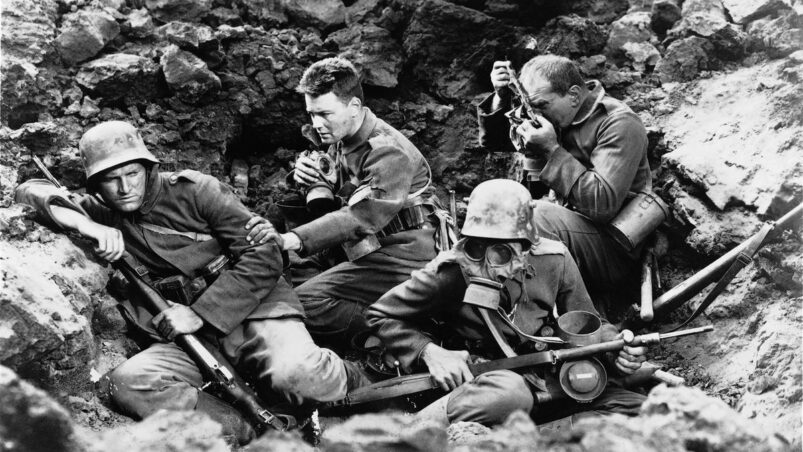All Quiet On The Western Front began as a novel by German war veteran Erich Maria Remarque. Published in 1929, this bestseller spawned its first film adaptation in 1930. Nearly a century later, Lewis Milestone’s film still captivates viewers with its grittiness and its unforgiving portrait of life in the trenches.
The film follows 18-year-old Paul Baumer (Lewis Ayres) from the classroom to the battlefield as a young German soldier. He, along with his friends, are idealistic and eager to fight in their first real war. Not long after their arrival, they’re confronted by the brutal realities of war. Their dreams of glory shattered, Paul and his friends now have only one goal – to survive a war that has killed millions around the world.
Lewis Milestone’s film came only a few years after the first “talkie” debuted. With screen performance being a relatively new medium, emoting for the camera was also novel and the performances are amateurish by today’s standards.
At times, the film feels like a play. The performances are often overdramatic and sometimes comedic as the actors over-emote for the screen. This little drawback, however, lends itself to the viewer’s relationship with the actors. Though clearly novices to the screen, all are committed to the characters and are never dull.
As a war film, Milestone went all-in on to bring the battlefield to the screen. Explosions are most certainly real with hundreds of extras daringly running through geysers of dust and water. The black-and-white rendering easily creates the dreary atmosphere of no man’s land.
More importantly, it blurs the lines between Germans/French/British/good soldiers/bad soldiers. It is literally humanity at its worst with no clear line between good and evil.
The film’s power ultimately comes from the characters and the philosophies they develop. When not faced with battle, Paul and his friends debate the ethics behind the conflict, and what started it. A passionate monologue by Paul to a naive classroom delivers the full extent of how war turns young men like themselves into troops lining up to be slaughtered.
At the same time, the film does not lose its humanity. Paul and his crew have several moments where they leave the war behind them, whether scrounging for food or flirting with local women on leave. Paul’s encounter with a wounded French soldier in a shell hole is particularly haunting, and equally inspiring as he tries to comfort his enemy in his dying moments.
Actor Lew Ayres was so affected by his experience as Paul Baumer that he became a committed pacifist and later served in the US military as a “conscientious objector.” Even at the height of the Second World War, Ayres never forgot the anti-war message that All Quiet On The Western Front delivered.
Lewis Milestone’s film is less than a decade shy of 100 years old, but its power can still be felt in a simple viewing. Humanity has yet to fully embrace the lessons offered by the film, but All Quiet On The Western Front (1930) remains a powerful testimony for a lost generation, and offers an unflinching look into the awful realities of war.
READ NEXT: Paris, Texas (1984) | Movies to See Before You Die
Some of the coverage you find on Cultured Vultures contains affiliate links, which provide us with small commissions based on purchases made from visiting our site.

![All Quiet on the Western Front [Blu-ray] [1930]](https://m.media-amazon.com/images/I/51FOTjqj3NL._SL75_.jpg)
